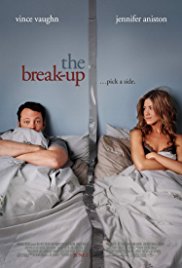 (Imaginary conversation between two women, presumably in their 20’s)
(Imaginary conversation between two women, presumably in their 20’s)
“Okay, so, Jennifer Aniston is, like, totally dumped by her hubby Brad, who shacks up with that homewrecker Angelina Jolie. But get this, she tooootally gets him back by hooking up with that “Wedding Crashers” guy, you know? Anyway, so Jennifer and Vince made this movie, but it’s about them, like, breaking up! I mean, who wants to see that?”
Who wants to see that, indeed. The entire Hollywood community, it appears, just wants Jennifer Aniston to be happy. So after test audiences revolted to the original ending to their movie, “The Break-Up,” cast and crew reassembled in Chicago in order to shoot a more pro-Jen ending…and audiences hated it even more than the original ending. But the problem with “The Break-Up” isn’t the ending, or the alternate ending (they chose the right one in the end, not that it mattered), but the execution of everything up to the ending. They made the same mistake that Danny DeVito made with “The War of the Roses”: the relationship between the two leads is so horrifically lopsided that by the time it comes to its inevitable conclusion, it’s hard to disagree, never mind care.
The movie begins with a meet-cute at Wrigley Field between Gary (Vaughn) and Brooke (Aniston), and after the happy-couple photo montage over the credits (it includes a lot of shots of Vaughn shirtless, which made me wonder who was shooting these seemingly intimate moments between Gary and Brooke), we see the domesticated Gary and Brooke, who share a condo. The friction between them is clear from the beginning: Brooke feels unappreciated, and Gary feels smothered. This presents itself in a rather unfunny fashion during an otherwise funny dinner scene involving both families that is absolutely stolen by John Michael Higgins, who plays Brooke’s a cappella singing brother. After the dinner party, Gary and Brooke have an argument, and by the end of it, Brooke breaks up with Gary.
But what to make of the condo that they bought together? Neither will move out, and so each takes turns trying to either assert their dominance or make the other jealous, with varying degrees of success. Gary buys the pool table he’s always wanted, while Brooke brings her dates to the condo when she’s not waltzing through the condo naked, after receiving the “Telly Savalas” treatment (please tell me you don’t need me to explain what that means) courtesy of her employer Marilyn Dean (a very pale Judy Davis). One of Brooke’s dates winds up blowing off their evening so he can keep playing video games with Gary.
The rules dictate that with a premise like this, hilarity must in fact ensue. And in some regards, it does, though it’s usually the supporting players who provide it. If Higgins is there for Aniston, Jon Favreau (who, as a White Sox fan, mocked the fans in Wrigley in a manner that I have seen with my own eyes, minus the subsequent fight and ejection from the park that fan received) is there for Vaughn, playing the only guy with any real sense of reality. Vaughn gets lots of funny lines, but he’s also clearly the bad guy in this relationship, leaving Brooke holding the bag at nearly every turn. To make matters worse, Gary’s attempts at getting even with Brooke are nothing short of juvenile (yes, he does something even worse than the pool table). Aniston, meanwhile, is given very little funny to do, and ultimately serves as the movie’s straight man, which is a waste of her talents. The girl can do funny. She spent 10 years doing it on TV; she knows her way around a punch line.
In order to make a movie like this work, both characters have to have flaws, but the filmmakers are so clearly determined to make a victim out of Aniston that we eventually agree and cannot wait for her to get rid of Gary once and for all, even though it’s not what she really wants. Some may say that the movie’s too mean for its own good, but the script’s inherent meanness isn’t the problem; the distribution of the meanness, however, is a problem. Gary, quite simply, does not deserve Brooke, which puts the movie’s premise on shaky ground from the beginning, and the laughs along the way turn out to be distractions, not enhancements. Also, someone needs to explain the jumpy camera shots in the kitchen during the first fight scene. I’ve seen hasty reshoots on movies before, but never that hasty.
“The Break-Up” is going to disappoint a lot of people who saw the movie’s hilarious trailer and expected another rapid-fire “Wedding Crashers”-style laugh fest. Chalk one up to the guys in editing for reducing the movie’s best bits to two minutes in length, and give a thousand lashes to everyone else who thought that they were telling a well-balanced story. These people have clearly never seen “Election,” Alexander Payne’s brilliant high school comedy that tells its story from multiple points of view and supports them all equally. There’s the lesson for the next person who dares to do a mean-spirited breakup movie: it can definitely be done, but you better, ahem, do your homework first.
 (2.5 / 5)
(2.5 / 5)



